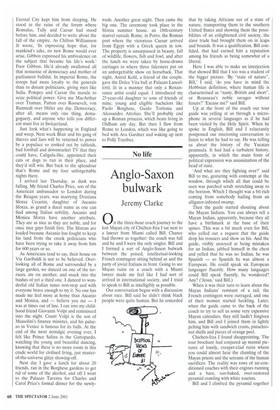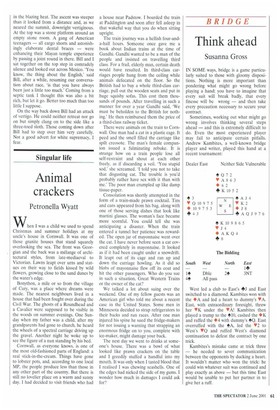No life
Anglo-Saxon bulwark
Jeremy Clarke
On the three-hour coach journey to the lost Mayan city of Chichen-Itza I sat next to a lawyer from Miami called Bill. Chance had thrown us together: the coach was full and he and I were the only singles. Bill and I formed a sort of Anglo-Saxon bulwark between the poised, intellectual-looking French contingent sitting behind us and the party of jovial Italians in front. Going to see Mayan ruins on a coach with a Miami lawyer made me feel like I had sort of arrived in international society, and I tried to speak to Bill as intelligibly as possible.
Our conversation began with a discussion about race. Bill said he didn't think black people were quite human. But he conceded that by taking Africans out of a state of nature, transporting them to the southern United States and showing them the possibilities of an enlightened civil society, the slave trade had brought them on in leaps and bounds. It was a qualification, Bill confided, that had earned him a reputation among his friends as being somewhat of a liberal.
Here I was able to make an interjection that showed Bill that I too was a student of the bigger picture. 'By "state of nature", Bill,' I said, 'do you have in mind the Hobbsian definition, where human life is characterised as "nasty, British and short", or Rousseau's noble savages without fences?' Excuse me?' said Bill.
Up at the front of the coach our tour guide was yelling at us through a microphone in several languages as if he had been visited by the Holy Spirit. When he spoke in English, Bill and I reluctantly postponed our interesting conversation to listen to what he had to say. He was telling us about the history of the Yucatan peninsula. It had had a turbulent history, apparently, in which the main form of political expression was assassination of the head of state.
'And what are they fighting over?' said Bill to me, gesturing with contempt at the window, through which all that could be seen was parched scrub stretching away to the horizon. Which I thought was a bit rich coming from somebody hailing from an alligator-infested swamp.
Then the guide started shouting about the Mayan Indians. You can always tell a Mayan Indian, apparently, because they all have a birthmark at the base of their spines. This was a bit much even for Bill, who yelled out a request that the guide drop his trousers and show us his. And the guide, visibly annoyed at being mistaken for an Indian, jabbed himself in the chest and yelled that he was no Indian, he was Spanish — so Spanish he was almost a European. He could speak six European languages fluently. How many languages could Bill speak fluently, he wondered? Any? (Jesus,' said Bill.) When it was their turn to learn about the Mayan Indians' remnant of a tail, the French contingent were outraged, and one of their women started heckling. Later, when the guide came to the back of the coach to try to sell us some very expensive Mayan calendars, they still hadn't forgiven him, and Bill and I joined them in lightly pelting him with sandwich crusts, pistachionut shells and pieces of orange peel.
Chichen-Itza I found disappointing. The tour brochure had conjured up mental pictures of lonely, creeper-clad ruins where you could almost hear the chanting of the Mayan priests and the screams of the human sacrifices. The reality was rows of air-conditioned coaches with their engines running and a bare, sun-baked, over-restored pyramid crawling with white tourists.
Bill and I climbed the pyramid together
in the blazing heat. The ascent was steeper than it looked from a distance and, as we neared the summit, downright vertiginous. At the top was a stone platform around an empty stone room. A gang of American teenagers — all cargo shorts and astonishingly elaborate dental braces — were enhancing their Mayan temple experience by passing a joint round in there. Bill and I sat together on the top step in comradely silence and looked out across Mexico. 'You know, the thing about the English,' said Bill, after a while, resuming our conversation about race, 'is that you have always been just a little too much.' Coming from a septic tank I thought this was also a bit rich, but let it go. Better too much than too little I suppose.
On the way back down Bill had an attack of vertigo. He could neither retreat nor go on but simply clung on to the side like a three-toed sloth. Those coming down after Bill had to step over him very carefully. Not a good advert for white supremacy, I fear.











































































 Previous page
Previous page